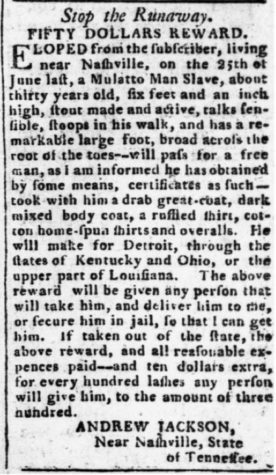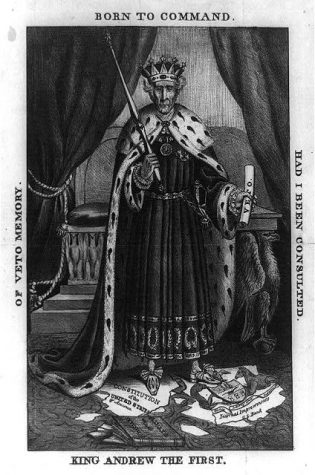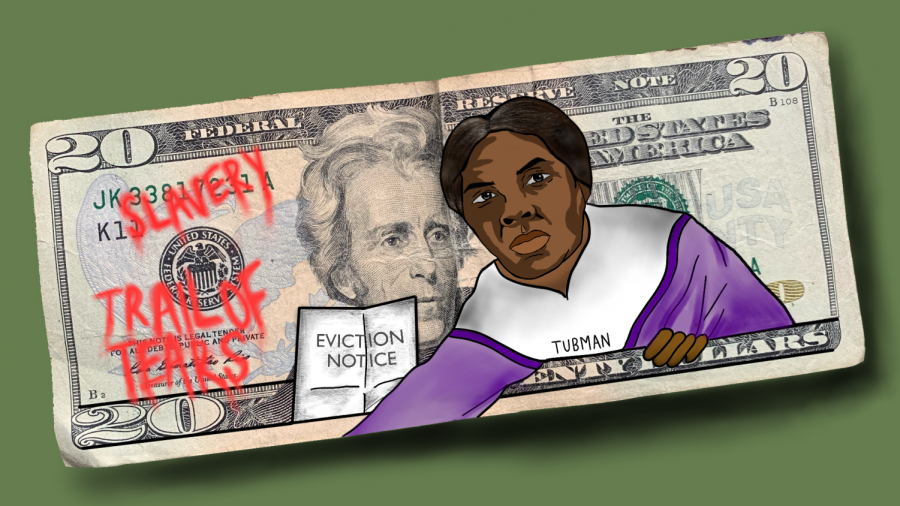It’s time for a $20 makeover
Graphic illustration by Crystal Qian
Harriet Tubman hovering over Andrew Jackson to replace him on the $20 bill.
December 9, 2020
In 2016, former Treasury Secretary Jacob Lew shocked the public when he announced that African American abolitionist Harriet Tubman would replace former president Andrew Jackson on the $20 bill. With dissenting opinions surfacing the media, one thing was clear: The country was advancing contentiously in its celebration of cultural, ethnic and racial interests. As 2020 draws to a close, however, hope that Tubman would grace the $20 bill — or that at least a preliminary design would be unveiled to the public — has vanished.
With paper currency being one of the most visible forums to honor a person’s memory, a banknote as widespread as the $20 bill should not be emblazoned with the likes of Jackson. His questionable decisions as president and deplorable actions against people of color suggest that he does not deserve public commemoration in any form.
Women on 20s
In 2015, a special interest group called Women on 20s launched a campaign to persuade the U.S. Treasury to place the image of an influential American woman on U.S. paper currency; currently, no female figures appear on federal reserve notes. Subsequently, Tubman was selected from a group of prominent female historical figures including Eleanor Roosevelt, Rosa Parks and Wilma Mankiller to supplant Jackson on the $20 currency.
In 2016, the Obama administration initiated a timeline that would unveil the bill’s design in 2020, the centennial of the ratification of the 19th Amendment, which established women’s suffrage. However, the Trump administration impeded its execution, with President Donald Trump paying homage to Jackson and openly supporting maintaining Jackson’s place on the $20 bill. Consequently, in 2019, Treasury Secretary Steven Mnuchin announced that the long-awaited design featuring Tubman would not be revealed in 2020 and that a future secretary would determine the fate of the banknote.
Women on 20s presents a cogent argument in support of removing Jackson from the $20 bill. Although some consider Jackson a national hero, his prominence is a relic of the past, as his character is at complete odds with current, evolved social beliefs. With very few, if any, women and people of color being historically valued, it is ill-conceived to turn down inspiring candidates who should be commemorated in favor of an unabashed white supremacist.
“We are a very different nation than we were almost 100 years ago, especially when it comes to advances in racial, ethnic and gender tolerance and our celebration of diversity,” said Susan Ades Stone, Executive Director of Women on 20s. “It would be fitting to reflect the changes in our society and say to current and future generations, ‘This is who we are and who you can aspire to be.’”
Until action is taken, though, the stony portrait of the Tennessee frontiersman, seventh president, war hero, slave owner and slave trader — will continue to glassily stare back at the American people.
Trail of Tears
The notorious architect of the “Trail of Tears” genocide, Jackson had a penchant for mistreating people of color and stereotyping them as unrelenting savages. During his presidency, he was resolute in his conviction of Native American removal from the South, legislating nearly 70 removal treaties. In 1830, Jackson infamously defied the Supreme Court ruling Worcester v. Georgia in signing the Indian Removal Act, which effectively uprooted almost 50,000 Native Americans from their ancestral lands in present-day Georgia, Mississippi and Florida to a newly designated Indian Territory in present-day Oklahoma.
Jackson’s verdict to ethnically cleanse the southeastern U.S. of its Native People marked the first major legislative departure from the recognition of the legal and political rights of Native Americans. Furthermore, Jackson’s Indian removal campaign set the stage for the Trail of Tears, in which an estimated one in four forced migrants perished on the trek. The Cherokee tribe was particularly affected, as approximately 20,000 Cherokees, including children and the elderly, were marched at gunpoint to present-day Oklahoma. Harsh winter conditions ravaged the tribe, and starvation, disease and exhaustion claimed the lives of more than 4,000 Cherokee migrants.

“Jackson was given the name ‘Indian killer’ by Native Americans,” said Barbara Ortiz Howard, Founder of Women on 20s. “From an early age, he fought and sought to kill Native Americans. The Trail of Tears was a destruction of their way of life and an outright state-sponsored theft of their lands, creating generational trauma and poverty.”
Undoubtedly, the Trail of Tears is one of the most brutal episodes in American history and the most harrowing legacy of the Jacksonian Era. Jackson was a perpetrator of genocide, the most heinous crime against humanity; accordingly, his preservation on the $20 bill is a blatant display of disrespect and cultural insensitivity toward the Native population.
Furthermore, the forced relocation of the Native Americans was not just a crime against humanity — it was a crime against humanity designed to abet another crime against humanity: slavery. Aside from benefitting white settlement, one of Jackson’s primary intentions through the signage of the act was to vacate lands for the cultivation of new slave plantations.

Slavery
Indeed, Jackson was a staunch supporter of slavery, brushing aside its clear immorality in owning hundreds of slaves, participating in slave trades, championing the expansion of slavery in the West and exploiting slave labor to build his fortune. Although pro-slavery views were omnipresent in the South, Jackson’s racist disposition was beyond reparation; he abhorred abolitionists, squashed anti-slavery efforts on sight and took it upon himself to personally hunt down fugitive slaves. U.S. presidents, particularly those who are memorialized, must be held to a high moral standard, and Jackson’s status on the $20 bill continues to honor and glorify a general who fought to preserve slavery.
Fiscal blunders
In addition to Jackson’s ignominious ownership of slaves, his antiquated ideas about finance render it ironic that his image would grace U.S. paper currency. Jackson opposed greenbacks, favoring gold and silver coins, also known as “hard money,” over paper currency. Given that he even refused to acknowledge paper money as a real form of currency, his placement on the $20 bill is quite the historical irony.
“Historians have not been able to figure out why Jackson was chosen for the $20 bill,” Stone said. “Some have speculated it was even some kind of joke, especially given Jackson’s disdain for paper currency over gold and silver-backed notes.”
An economic illiterate, Jackson vehemently despised and eventually dismantled the National Bank, which prompted a nationwide financial crisis and an economic depression. His ruinous banking decision triggered the Panic of 1837, for which his presidential successor, Martin Van Buren, was labeled as the scapegoat by the public. His place on U.S. paper currency, then, seems even more illogical.

King Andrew
Jackson’s presidency ended after eight controversial years of autocratic behavior and disregard for federal law. During his term, Jackson seldom yielded to Congress and was quick to exercise his presidential veto power to pursue his own agenda. Because of his alleged thirst for absolute presidential power, Jackson’s opponents considered him to be autocratic and a menace to political harmony. An entire political party — the Whig Party — was formed to oppose the despotic rule of “King Andrew,” as Jackson widely came to be known. The widespread criticism and disapproval associated with Jackson’s presidency indicate that his place on U.S. currency is unwarranted and by no means an accurate reflection of the public’s perception of him.
Harriet Tubman
Conversely, Harriet Tubman, widely regarded as “The Moses of Her People,” is a fitting replacement for Jackson, for she emancipated many of the same slaves that Jackson’s policies exploited. Born a slave in 1820, Tubman refused to settle under the grievous oppression of slavery and displayed exceptional courage in risking harm for her freedom. After escaping from bondage in her twenties, she dedicated her life to abolitionism and helping others achieve freedom through the Underground Railroad, a secret network of safe houses and abolitionists. Between 1850 and 1865, Tubman rose to prominence as its most well-known conductor, guiding more than 300 runaway slaves to freedom. Through all of her trips, Tubman never lost a single passenger, and she was so successful that slave owners posted a $40,000 reward for her capture. Along with Frederick Douglass and Sojourner Truth, Tubman gained momentum as a leading abolitionist, equal rights crusader and testament to the humanity of slaves.
During the Civil War, Tubman further distinguished herself by volunteering as a Union cook, nurse, scout and spy. Her knowledge of Southern transportation routes as a former conductor of the Underground Railroad made her an invaluable asset to the Union. In 1863, she accompanied Union Colonel James Montgomery on a treacherous and now legendary gunboat raid in South Carolina that liberated more than 700 slaves. After the war, Tubman participated in humanitarian work, partook in social activism and joined Elizabeth Cady Stanton and Susan B. Anthony in their quest for women’s suffrage.
Tubman is a true American hero, icon of freedom and the epitome of courage and selflessness; cementing her admirable legacy on the $20 bill is a long-overdue acknowledgement of her achievements, and doing so would send a powerful message about the social interests of the country.
“Our country was built on the values of freedom and equality, which is exactly what Tubman fought for,” said Marissa Dai, Junior State of America Public Relations Officer. “African Americans have been a part of our history since day one, yet they are continually overshadowed by the same people who oppressed them. As we move forward, it’s critical that we re-evaluate the people we choose to represent our nation and choose someone to empower those who need it most, and not just another old white man.”
Future of the $20 bill
With the fate of the $20 bill still up in the air, Mnuchin announced in 2019 that no new imagery will be unveiled until 2028 at the earliest. Regardless, Jackson’s disgraceful track record suggests that his commemoration on the $20 bill is a travesty. Although Jackson’s selection in 1928 might have been fitting at an apex of lynchings, Jim Crow laws and racial tension, changing times necessitate the relegation of undeserving political figures below honorable icons of history.
“Notwithstanding the common conjecture [of] why Jackson is on the $20 [bill], he was likely a deliberate choice to tell a sugarcoated, white-centered history of mythological heroes, [which was] a popular trend at the time,” Howard said. “Hopefully the selection of Janet Yellen as the new Secretary of the Treasury will fast-track Jackson’s removal from the $20 bill and a replacement by those he sought to destroy.”
While Jackson represents the nation’s past, Tubman sets a precedent for the future — one of growing equality and diverse representation. Perhaps it is time for Old Hickory to retire from the field and relinquish his seat on the $20 bill, giving the banknote a rightful, long-overdue makeover.





























































